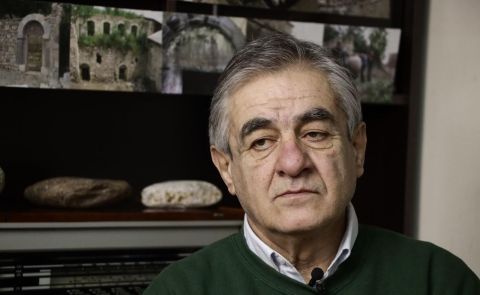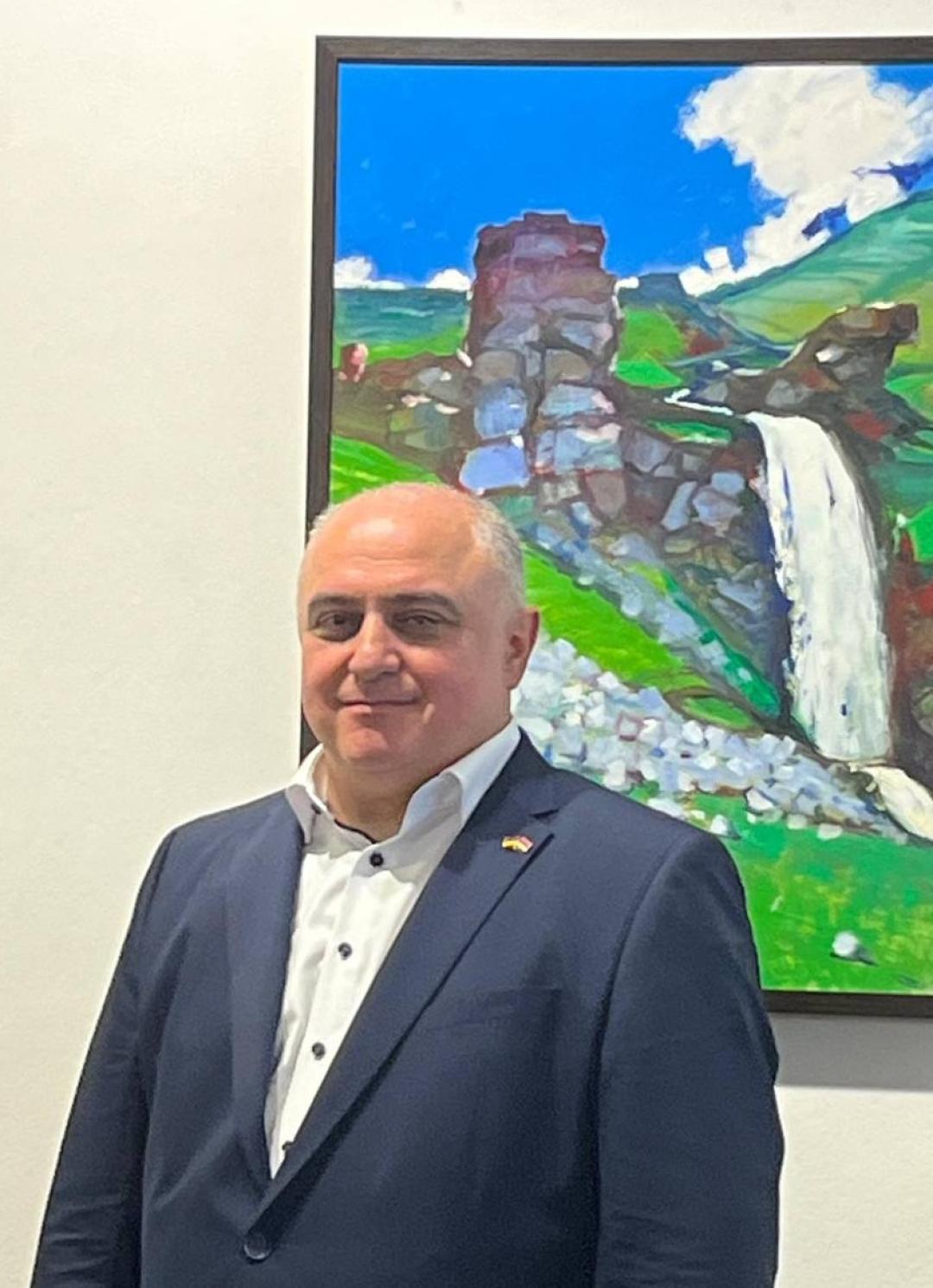
Manifest: “The Vision to Connect Armenians and Preserve the Identity”

The Armenian diaspora is one of the most significant parts of Armenian society, with a population greater than that of the Republic of Armenia. Previously, the country had a dedicated ministry for diaspora relations, but since 2019, the Office of the High Commissioner for Diaspora Affairs has taken on this role. The issue of the Armenian diaspora is always a focus for Armenian political parties, and the diaspora consistently supports Armenia through various funds and initiatives.
Based in Berlin, Mikayel Minasyan has been developing a theory on strengthening relations between the Republic of Armenia and the Armenian diaspora. He published a scientific work titled “Manifest: Theory of the Interweaving of Infrastructures Between Diaspora and Armenia.”
While studying at Yerevan State University, Mikayel Minasyan was given the opportunity to attend a summer school at Bamberg University. During his stay, he laid the groundwork for his further studies at Bamberg University. He returned to Germany the following year to continue his education in German Studies and Communication. In 2009, he moved to Berlin and realized that the Armenian community there needed consolidation and organization.
Since 2010, he has been actively involved in the community, establishing a Sunday school that not only taught Armenian language and culture but also conducted exams and issued certificates to those who passed. He later helped to organize the Armenian Apostolic Church in Eastern Berlin. His social activities led to the creation of the Association of the European and Armenian Experts. This association has carried out various activities, including “Armenian Apostolic Liturgy in East Berlin” and “IT Classes for Wounded Soldiers and Displaced People from Nagorno-Karabakh.”
Alina Martirosyan, the mother of current Berlin State Parliament member Prof. Dr. Martin Pätzold, once attended one of their liturgies. During the visit, she asked the community to support her son, who was running for the Bundestag. The Armenian community agreed, leading to Mr. Pätzold's election as a Bundestag MP representing the Christian Democratic Union, CDU/CSU. This marked the beginning of their relationship, and eventually, Martin Pätzold became an honorary member of the Association of European and Armenian Experts.
In 2015, together with Alina Martirosyan, Mikayel Minasyan initiated the German-Armenian Cultural Days in Berlin. This is a series of cultural events taking place annually, featuring concerts, exhibitions, lectures, and other events.
Last year, in 2023, he released an updated edition of his book “Manifest: Theory of the Interweaving of Infrastructures Between Diaspora and Armenia,” a scientific work analyzing Diaspora-Armenia-Nagorno-Karabakh relations from the perspective of communication science. The book offers structural options for unity and cooperation among Armenians worldwide.
Mikayel Minasyan told Caucasus Watch that he had been working on “Manifest” for over two decades. The idea first came to him while studying in Armenia, and as he continued his studies in Germany, he realized that he should use his knowledge to develop his ideas. “I tried to propose a scientific framework where connections and unity between the diaspora and Armenia are plausible. Moreover, it is possible to coordinate,” Minasyan says, emphasizing that Armenia cannot survive without its diaspora and that the Armenian diaspora would assimilate faster if it didn’t receive support from Armenia. “The question arises: what can one give to the other?”
He pointed out that during the last 30 years, Armenia primarily expected material support and lobbying from its diaspora. However, the 44-day war in Nagorno-Karabakh revealed that without aligned foreign interests, such support is limited. “We saw during the war that we were all alone. Despite our high expectations, we didn’t receive any support, except from the diaspora,” Minasyan explains. He believes that effective relationship modeling requires more structured communications.
He asserts that the diaspora and the Republic of Armenia have a pyramid-shaped relationship, with the diaspora inheriting the decisions made by the Armenian government. “The diaspora tried to fulfill those requests. This is how many villages, roads, and hospitals were constructed in Nagorno-Karabakh, and they were left under Azerbaijan’s control,” Minasyan says. He argues that this approach cannot continue, as it is one-sided and lacks control.
Mikayel Minasyan proposes that if the diaspora contributes economically, it should also have a role in shaping policies and laws to represent its interests. “It’s absurd that the second parliamentary chamber is not being formed or that the Ministry of Diaspora was downgraded to a committee, becoming the Office of the High Commissioner for Diaspora Affairs,” Minasyan says. To address this, the “Manifest” proposes a new system consisting of three major parts: political, economic, and cultural-educational.
The "Manifest" proposes the creation of an election-based Pan-Armenian Assembly with representation from the diaspora, the Republic of Armenia, and local Armenian institutions. He also proposes forming a Pan-Armenian Alliance with task groups that will cover the economic and cultural-educational fields.
Mikayel Minasyan also envisions an online platform for Armenians to connect and do business. During the 2016 Four-Day War in Nagorno-Karabakh, he experienced an attack on the website he had created. “Armenians need a closed platform for corporations and an open one to sell their products,” he says, adding that the Armenian economy should diversify and use new technologies to grow.
After presenting his idea to the Ministry of Diaspora and giving interviews to local TV channels in 2014, Mikayel Minasyan successfully brought together 350 companies and registered over 1,000 contacts in his database. Despite its short life, the platform managed to connect Armenians living across the globe and implement projects such as the films “Grandma’s Tattoos” and “Sunrise Over Lake Van.” “This platform enabled Armenian filmmakers to receive funding from a Swedish-Armenian. UNIDO (United Nations Industrial Development Organization) also signed up on the platform, and they started projects making natural gas in different communities in Armenia,” Minasyan recalls.
For the cultural-educational aspects, Mikayel Minasyan believes that preserving Armenian roots cannot be achieved solely through Sunday schools. “Since 2010, I have run an Armenian Sunday school in Berlin with over 120 graduates, but I cannot claim that I managed to preserve their Armenian identity. It’s impossible to preserve their language and culture in just 2-3 hours a week. After 2-3 generations, they will be assimilated,” he says. Mikayel Minasyan suggests creating a network of schools where students study in the local language but also learn Armenian language, history, literature, and culture. “This will not only solve the problem of assimilation but also help with lobbying—when locals attend an Armenian school, they are already pro-Armenian.”
Mikayel Minasyan presented his ideas to former Diaspora Minister Hranush Hakobyan and the High Commissioner for Diaspora, Zareh Sinanyan, but he did not receive any official support. “They told me to try it in Germany, and if it succeeds, they might consider adopting parts of it,” he recalls. He didn’t receive official support. Mikayel Minasyan believes that such a huge project needs support at the state level, as it aims to unite the Armenian community rather than serve business interests.
Mikayel Minasyan points out that his proposal is not novel—many Armenian political parties have included similar ideas in their programs. The difference lies in the implementation method. “Today’s virtual world gives us that opportunity. If the communication channels were much more difficult a century ago, people could exchange only a small amount of information. Now it’s just a matter of seconds,” he explains, emphasizing that Armenians must prioritize national interests over individual egos.
Lastly, Mikayel Minasyan has been presenting his book to Armenian communities across Europe—in Paris, Brussels, Utrecht, Cologne, Frankfurt, Munich, Berlin, and Hamburg. “People say, we are ready; where is it? Bring it to us,” he says, adding that they are currently rebuilding the website to comply with all security standards. He believes in the viability of his idea, as virtual banks have been a reality for a long time. “Why can’t Armenians have at least virtual unity? We were lacking vision; we were lacking the scientific proposition. Here it is.”
Contributed by Ami Chichakyan, Germany.
See Also


Irina Mamulashvili: Electoral Interference is a Playbook, not a Recipe

Giorgi Gakharia: The EU Should Engage Georgia Despite Its Democratic Backsliding

Peace or Capitulation? Shahverdyan on Armenia-Azerbaijan Agreement and the Nagorno-Karabakh Crisis

Ali Mousavi Khalkhali: Iran Will Avoid Conflict in the Caucasus

